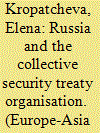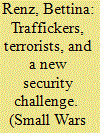| Srl | Item |
| 1 |
ID:
131151


|
|
|
|
|
| Publication |
2014.
|
| Summary/Abstract |
This article examines Belarusian strategies in the bilateral politico-military alliance with Russia, focusing on the issue of recognition of Abkhazia and South Ossetia, in addition to the evolution of the Collective Security Treaty Organisation. It argues that the approaches interpreting the alliance as a response to decisions of external actors cannot fully account for the disagreements between the parties. The analysis of Belarusian strategies demonstrates how the decisions of external actors, such as the European Union and to a certain extent the North Atlantic Treaty Organisation, function as bargaining chips for the Belarusian leadership. Due to the intra-alliance security dilemma, external actors have at times even weakened the alliance rather than automatically inducing its cohesion.
|
|
|
|
|
|
|
|
|
|
|
|
|
|
|
|
| 2 |
ID:
114744


|
|
|
|
|
| Publication |
2012.
|
| Summary/Abstract |
The proclaimed function of the Shanghai Cooperation Organisation (SCO) is regional security management. Nonetheless, it has never conducted a conventional peacekeeping operation, in spite of incidents of mass violence and instability within its region. This is in large part because regional elites consider state/regime security as paramount and that the SCO's central principle of non-interference takes precedence over intervention on humanitarian grounds. This article investigates the debate within the SCO about the relative salience of non-interference against the need for peacekeeping operations, examining the case of its non-action during the Osh Riots 2010. It concludes that considerations of political reassurance and inter-regime mistrust at a regional level and serious practical limitations in capacity dissuaded the most prominent member states from acting, via the SCO, Collective Security Treaty Organisation or independently, in what was perceived as an internal Kyrgyz affair because it did not directly threaten the security of the other members' regimes.
|
|
|
|
|
|
|
|
|
|
|
|
|
|
|
|
| 3 |
ID:
148821


|
|
|
|
|
| Summary/Abstract |
Ambivalence and misconceptions surround the Collective Security Treaty Organisation (CSTO). Relying upon the literature on multilateralism, state–IGO relations, regionalism and security governance, this study examines: which goals Russia is pursuing in its CSTO policy; how Russia engages with its individual members within the organisation; how Russia uses it in five foreign policy situations and with which results. It shows that Russia’s CSTO policy is more mixed and complex than is usually assumed. Russia uses the CSTO in pursuit of unilateral ambitions but it is also searching for partners. Russia’s policy has resulted in the formation of instrumental multilateralism within the CSTO.
|
|
|
|
|
|
|
|
|
|
|
|
|
|
|
|
| 4 |
ID:
103966


|
|
|
|
|
| Publication |
2011.
|
| Summary/Abstract |
The collapse of the Soviet Union precipitated the massive expansion of drug use and trade in Russia. The country now has one of the largest populations of injecting drug users in the world and has become the largest single-country market for Afghan heroin. In 2003 the Federal Service for the Control of the Drugs Trade was created to coordinate a comprehensive counternarcotics strategy appropriate to the scale of this threat. The service continues to face a number of challenges in its early stages of development. However, it has made considerable advances in improving responses to large-scale organised crime and in building international cooperation.
|
|
|
|
|
|
|
|
|
|
|
|
|
|
|
|